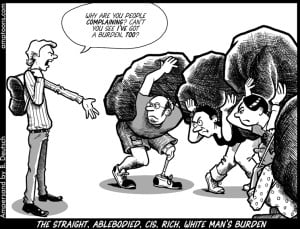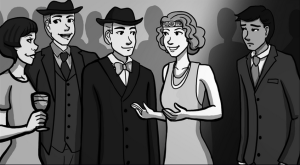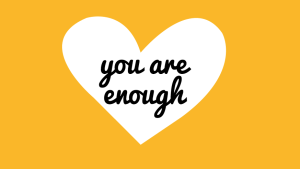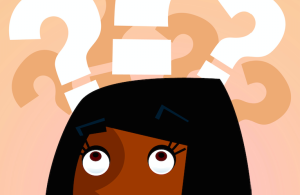
Credit: Inkblot
One of the things I like to do when I read an interesting and controversial article online is check out the comments section. I like reading others’ perspectives on subjects in which I’m interested.
But lately I’ve noticed a troubling trend, especially within feminist circles in cyberspace. While most comments start out being constructive, some eventually turn negative.
Usually someone jumps into the conversation and attacks either the author of the article or another commenter directly.
Although remarks vary, the theme is always the same: “You don’t know what you’re talking about. You suck and here’s why.”
It typically goes something like this:
“How can you say that (insert oppressed group of your choice here) have it so hard? I’m from (insert oppressed group of your choice here). I know real oppression. You’re so f*cking stupid. Get a hobby.”
And before you know it, others jump into the conversation and what was once a constructive group discussion has become a cyber drama.
We all know that the internet is a great way to express oneself, but there’s a difference between expressing your own opinion and attacking someone directly.
When you make personal attacks, you’re saying that what they have to say is unimportant and what you have to say is more important. You’re discounting the full range of their experiences and placing your struggle ahead of their own.
This is what’s known as the Oppression Olympics, and it’s a game we shouldn’t be playing.
It’s like saying, “you were only raped once as an adult and I’ve was pimped out by mother since I was 9. So your trauma doesn’t count and only mine does.”
I would like to think that nobody would say things like that. But we definitely do when it comes to different social groups of people.
The truth is we are all oppressed, exploited, and discriminated against in some ways. And at the same time, we’re also privileged in other ways as well.
And if you don’t think so, just read a little history or watch the news – there’s always some group of people in the world who have it far worse than you do.
And besides, we can’t claim to know what someone else has gone through until we’ve at least had an open and honest conversation about it (which doesn’t normally happen after taunting comments).
I’m not saying we can’t point out discrepancies or remarks that are not representative of someone’s experiences. For example, as a white woman living in the Midwest, I wouldn’t claim to understand what a black woman in the South has been through. If I were to make a remark about the experiences of a black woman in Alabama, for example, I would expect to be called out on it. Same goes for other factual information that has been distorted.
But there’s a difference between pointing out errors and vilifying someone. If you vilify someone, you’re trying to silence them. And silencing someone is no less than putting someone in their place and bringing them down.
We shouldn’t oppress others for the sake of validating our own oppression. This is nothing more than kyriarchy and it’s something no one should have to put up with.
So please, let’s all keep it respectful and not silence people through personal attacks. That would be very anti-feminist indeed.
Have you been verbally attacked online? If so, what did you do to overcome it? Share in the comments below!
Shannon Ridgway is a Contributing Writer to Everyday Feminism from the great flyover state of South Dakota (the one with the monument of presidential heads). In her free time, Shannon enjoys reading, writing, jamming out to ’80s music and Zumba, and she will go to great lengths to find the perfect enchilada.Follow her on Twitter @sridgway1980.
Search our 3000+ articles!
Read our articles about:
Our online racial justice training
Used by hundreds of universities, non-profits, and businesses.
Click to learn more



















